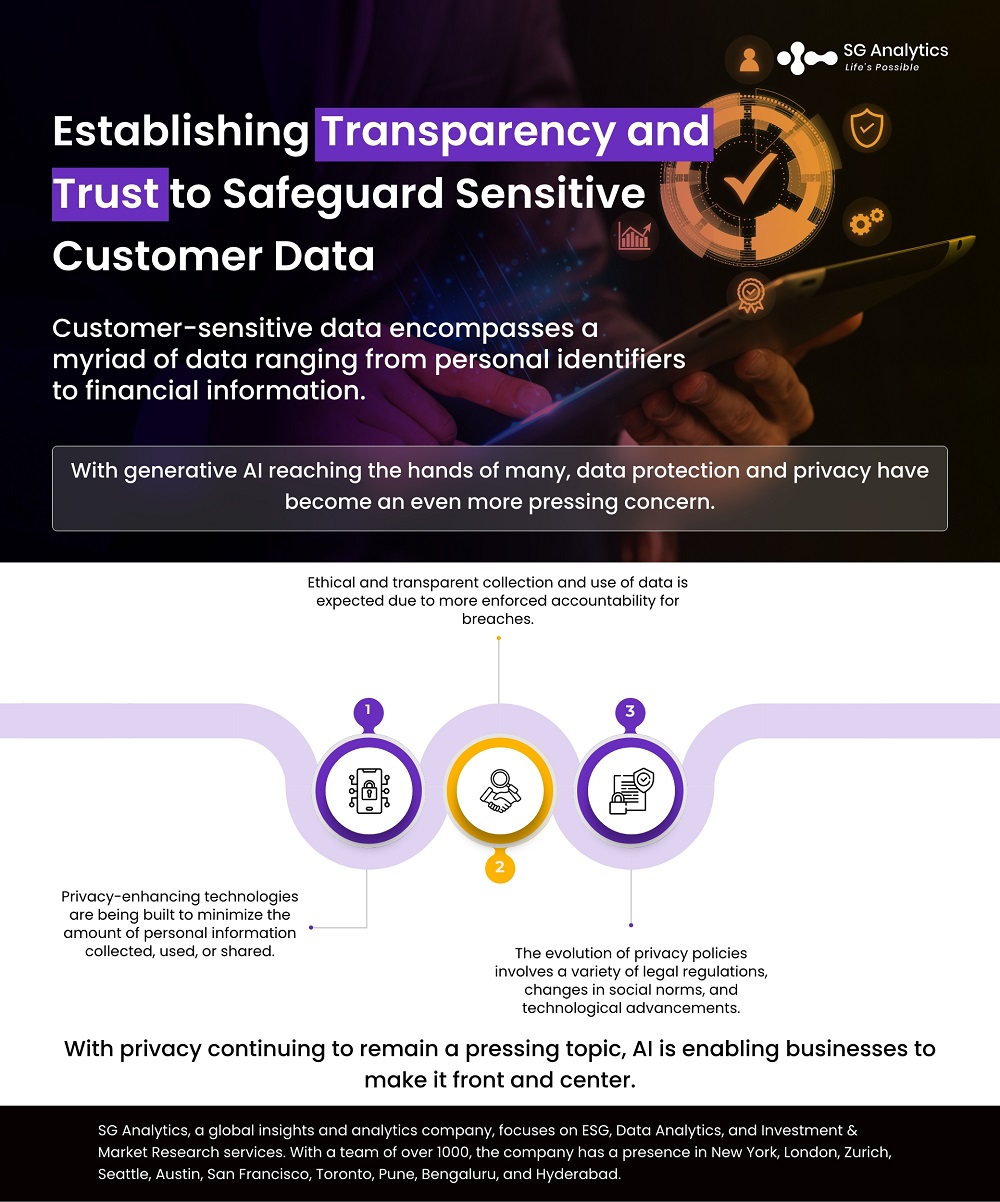In today's digital age, where data is the lifeblood of organizations, protecting customer-sensitive information has never been more paramount for businesses. As the custodians of this invaluable information, businesses need to adopt a proactive stance to guarantee their safety, integrity, and compliance.
With the ever-evolving privacy regulations, there is a growing specific focus on customer-sensitive information. Safeguarding sensitive data has never been more critical, as the consequences of data breaches can be devastating, including legal repercussions and financial losses. Hence, prioritizing data security and services is imperative.
Read more: ‘Engaging’ Social Media Content: A Critical Metric for Brands
The Exponential Explosion of Data
With the world becoming interconnected, digital technology is permeating every aspect of our lives, and cybersecurity is becoming a paramount concern. From individuals to large corporations, the need to safeguard sensitive information and digital assets has never been more critical. To adapt to the evolving landscape, businesses are exploring the importance of cybersecurity regulations and integrating essential measures to protect customer data against any data thefts or security breaches.
Customer-sensitive data encompasses a myriad of data ranging from personal identifiers to financial information. It is the bedrock of trust between businesses and their customers. Mishandling or unauthorized access to this data can lead to severe consequences. Consequently, safeguarding consumer data should be a top priority for organizations, regardless of their size or industry.
Over the past year, with generative AI reaching the hands of many, data protection and privacy have become an even more pressing concern. It is an especially important topic for business leaders, governments, and consumers.
The variety and volume of data have been exponentially growing due to the proliferation of digital technologies. While there have been enormous positive innovations because of data, there has also been a rise in negative impacts. From data breaches to ransomware attacks and phishing scams, the breadth and depth of data threats pose significant risks to individuals and businesses. The impact of cyber-attacks is far-reaching, from financial losses and reputational damage to compromised privacy. By implementing robust measures and fostering a culture of awareness, businesses can protect and ensure a safer and more secure future for all.

While data is set to grow on this exponential graph as it is powering more data-driven technologies, industry leaders need to incorporate measures to use data in a way that is beneficial and responsible.
Consumer Awareness and Expectations
The rapid growth of data, especially personal data, has led to personalization. But this is going too far and invading the customer's privacy. The scale and availability of data have created a huge cyberattack surface for data and privacy breaches.
Protecting customer data today has become crucial for businesses to keep customers and maintain their trust, as consumers are realizing the value of their data and prioritizing privacy.
However, to help enterprises understand consumers’ attitudes about data, there is a growing need for awareness of how customer data is collected, used, and valued. If organizations understand how much data is worth to consumers, they can provide commensurate value in return.
Due to government regulations, businesses are re-evaluating their data-handling approaches and implementing new procedures to comply with regulations. This greater desire for privacy and elevated cybersecurity risks have led governments and businesses to act by integrating regulating data privacy and protection to protect individuals and businesses and restrict how data can be accessed, collected, stored, and shared. In addition to creating these laws, governments are also enforcing measures to ensure that businesses and organizations comply with the regulations. To mitigate the risks of a vast, cyberattack, companies are prioritizing more cybersecurity measures to protect customer data.
Making the exchange transparent is becoming increasingly important to foster trust. Firms can earn access to consumers’ data by delivering value in return. However, trust plays an essential role. The more trusted a business is, the more willing consumers will be to share their data.
Read more: Data Analytics Tools and Software in 2023 - Comprehensive Guide

Data Privacy and Protection Policies: The Next Stage
The evolution of privacy policies involves a variety of legal regulations, changes in social norms, and technological advancements. These factors are giving rise to different privacy trends that are increasingly putting pressure on businesses.
Consumers, businesses, and regions want to take control of their data. In this increasingly digital world, consumers and businesses want to ensure that their sensitive data is protected from unauthorized access, misuse, or data breaches. When giving permission for other parties to access and use their data, it should be done in a way that is ethical as well as responsible and under strict privacy regulations.
Ethical and transparent collection and use of data is expected due to more enforced accountability for breaches and misuse. These expectations for control are leading businesses to be more upfront about how they are collecting and using data. Consumers today prefer to engage with entities that are transparent with how information is collected as well as used. They expect information to be readily available to them as more and more businesses are creating public commitments outlining their privacy approach. This implies more accountability for businesses to stick to their privacy policies.
More privacy-enhancing technologies are being built to minimize the amount of personal information collected, used, or shared. More privacy-enhancing technologies are being created to help businesses incorporate a higher level of privacy. These technologies are enabling businesses to minimize the amount of personal data collected, used, stored, or shared. While many PETs are becoming the standard for good privacy policies, additional innovation is still required to make privacy more robust and accessible.
More products, services, and systems are taking these privacy trends into account proactively in their development and design phases. There is a rise in privacy by design, where organizations are incorporating privacy into the initial stages of the creation of apps, products, and more.
Read more: Big Data Analytics: Turning Data into Actionable Insights

The Impact of Privacy on Customer Experience and the Path Ahead
With the explosion of digital technologies, organizations are cleaning vast data sets related to consumers’ activities. Feeding this trend are new intelligent solutions that gather and transmit detailed information.
A recent Gartner study highlighted that 84% of businesses perceive data privacy as the most valuable factor for them. With good privacy becoming table stakes, without it, businesses will end up losing customers and falling behind. Leading organizations are exploring new data protection and privacy policies to create a huge competitive advantage.
Businesses, especially customer experience (CX) leaders, are feeling a growing need to incorporate more privacy regulations in the customer journey. This involves data masking, minimization, visibility, and field-based permissions. Additionally, it is also becoming easier for them to accomplish this as better privacy technologies are built. With privacy continuing to remain a pressing topic, especially heading into 2024, AI is enabling businesses to make it front and center.
SG Analytics, recognized by the Financial Times as one of APAC's fastest-growing firms, is a prominent insights and analytics company specializing in data-centric market research and contextual analytics. Operating globally across the US, UK, Poland, Switzerland, and India, we expertly guide data from inception to transform it into invaluable insights using our knowledge-driven ecosystem, results-focused solutions, and advanced technology platform. Our distinguished clientele, including Fortune 500 giants, attests to our mastery of harnessing data with purpose, merging content and context to overcome business challenges. With our Brand Promise of "Life's Possible," we consistently deliver enduring value, ensuring the utmost client delight.
A leading enterprise in Customer Analytics, SG Analytics focuses on leveraging cutting-edge technologies and methods to provide cutting-edge customer analytics solutions and retain your customers by preventing churn-inducing customer behaviors. Contact us today to make critical data-driven decisions and develop more effective customer engagement initiatives, leading to happier customers.
About SG Analytics
SG Analytics is an industry-leading global insights and analytics firm providing data-centric research and contextual analytics services to its clients, including Fortune 500 companies, across BFSI, Technology, Media and entertainment, and Healthcare sectors. Established in 2007, SG Analytics is a Great Place to Work® (GPTW) certified company and has a team of over 1100 employees and has presence across the U.S.A, the U.K., Switzerland, Canada, and India.
Apart from being recognized by reputed firms such as Analytics India Magazine, Everest Group, and ISG, SG Analytics has been recently awarded as the top ESG consultancy of the year 2022 and Idea Awards 2023 by Entrepreneur India in the “Best Use of Data” category.









